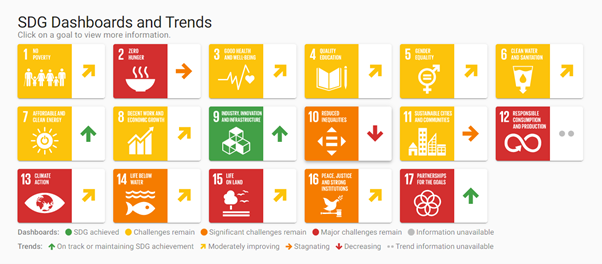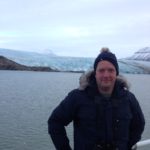Transforming our Practice, Transforming our World
By Henry McGhie, Curating Tomorrow
As part of its Cultural Recovery Funding, GEM asked me to develop two workshops to help GEM members make use of sustainable development approaches. This blog post follows on from the first workshop, held on 2 June. As with sustainable development generally, initiatives don’t arise out of nowhere: they build on what was done before, and they help set the course to future work. The two workshops aim to empower museum educators, so that they in turn can help empower those who make use of museums, to be active agents in creating the futures they want to see themselves. We’ll return to this topic in the second webinar. The workshops aim to provide space for people to explore what this means for them, in terms of their challenges, opportunities, and concerns.
Why Sustainable Development?
It is a good time to be considering the challenges of today and the future, and our ability – our resilience – to adapt and thrive in the face of those challenge. COVID-19 has caused huge disruption, tragic loss of life, and a massive economic challenge. However, COVID-19 also serves to highlight the weaknesses that existed within the museum sector, and in society, before the pandemic. Resilience-building is an approach that aims to learn the lessons, and to change tack, to ensure that the sector comes out of the pandemic stronger, or at least that it doesn’t try to get back to the same place, as that is just a recipe for a repeat occurrence. Resilience-building is a key aspect of sustainable development, which is about seeking to create a more harmonious balance of considerations of people, planet and prosperity (the three dimensions of sustainability, formerly usually referred to as social, environmental and economic sustainability). As we see with COVID-19, these three aspects are very closely connected: what would seem to be a health problem quickly becomes an economic one, and as it turns out is probably linked to environmental destruction.
Sustainable development is often thought of as linked to aid or to the Global South. When the Sustainable Development Goals were developed (by the UN, in a massive cross-society consultation exercise), during 2012-15, there was a recognition that there are problems in every country. For example, the last Sustainable Development Report, from June 2021, shows that the UK is only on track to meet one of the 17 Sustainable Development Goals by 2030, and the picture is an extremely challenging one that will require greater attention. It is reasonable to assume that COVID-19 will have made the situation even worse. It can be easy to say that this is down to governments to fix, but governments on their own are neither able, or in some cases willing, to risk making the major transformations required. Everyone can take part in sustainable development, and the SDGs were developed by an extensive consultation, so they do have a public mandate. They are also set out as an invitation to all of society to collaborate to meeting the challenges of today. They are rooted in principles of human rights, apply everywhere to achieve sustainable development, and in ways that ‘leave no-one behind’- being locally owned and based on ‘active, free and meaningful participation’, rather than being top-down. They are not just the UN’s sustainable development goals, but society’s [societies’].
UK status of Sustainable Development Goals, 2021, shown using a traffic-light system (red= major challenges, orange= significant challenges; note, there is only one ‘green’)

Education for Sustainable Development as an opportunity for GEM members
Where do museums and GEM come into this? Education is widely seen as fundamental in empowering people to know, care and act, whether in terms of sustainable development or indeed anything else. Education for Sustainable Development is a particular pedagogy that has a long track record. This has its own target within the SDGs (SDG 4.7): ‘By 2030, ensure that all learners acquire the knowledge and skills needed to promote sustainable development, including, among others, through education for sustainable development and sustainable lifestyles, human rights, gender equality, promotion of a culture of peace and non-violence, global citizenship and appreciation of cultural diversity and of culture’s contribution to sustainable development.’ ‘All learners’ means all people, as part of formal, non-formal and informal education and learning. UNESCO has produced a fantastic document, ‘Education for Sustainable Development: learning objectives’, that gives a set of intended outcomes for each of the SDGs. I really encourage all of you to have a look at this. UNESCO uses a ‘three-domain’ learning model, which emphasises that education and learning are most effective when they combine knowledge, attitude and skills development, and practical skills – which can be paraphrased as thinking, feeling and doing; or heads, hearts and hands.
The commonly used definition of Education for Sustainable Development, from UNESCO, says ESD “empowers learners to take informed decisions and responsible actions for environmental integrity, economic viability and a just society, for present and future generations, while respecting cultural diversity.
It is about lifelong learning, and is an integral part of quality education. ESD is holistic and transformational education which addresses learning content and outcomes, pedagogy and the learning environment.
It achieves its purpose by transforming society.”
There are some really fantastic resources and opportunities available that you can use ‘off the shelf’, or tailor to your own needs. UNESCO has a new Education for 2030 Roadmap, which is supported by an online toolbox. The five priority actions for the Roadmap are: advancing policy, transforming learning environments, building capacities of educators, empowering and mobilizing youth, and accelerating local level actions. At the World Conference on Education for Sustainable Development, in May, the Roadmap was adopted, along with a short Berlin Declaration, which sets out the value of Education for Sustainable Development, and concrete steps that can be taken to support its implementation.
GEM and sustainable development: shared visions for shared futures
GEM’s new vision and mission show you are already advancing policy: you have made the commitment to empower your members to empower others to play a part in the world. Our webinars aim to build educators’ knowledge, confidence and skills to support learning and education linked to sustainable development. Participating in sustainable development is a lot easier than many people think: it is not about vague discussion about what sustainability is or isn’t, but about focussed, concrete action that takes note of the social, economic and environmental challenges – and opportunities – faced by people in our contexts. It develops focussed interventions that support people to meet or overcome those challenges, to a better, fairer, greener future for all. In order to empower others, we also have to be empowered ourselves. GEM’s webinars aim to help do this.
Transforming our Practice, Transforming our World (Part Two) has now passed.
Further information and links to resources
McGhie, HA (2019). Museums and the Sustainable Development Goals. Curating Tomorrow, https://curatingtomorrow236646048.files.wordpress.com/2019/12/museums-and-the-sustainable-development-goals-2019.pdf
McGhie, HA (2020). Museums and Disaster Risk Reduction: building resilience in museums, society and nature. Curating Tomorrow, https://curatingtomorrow236646048.files.wordpress.com/2020/07/museums-and-disaster-risk-reduction-2020.pdf
UNESCO (2017). Education for Sustainable Development: learning objectives. UNESCO, https://unesdoc.unesco.org/ark:/48223/pf0000247444
UNESCO, Education for Sustainable Development, ESD 2030 Toolbox https://en.unesco.org/themes/education-sustainable-development/toolbox
UNESCO, Sustainable Development Goals, Resources for Educators, https://en.unesco.org/themes/education/sdgs/material
ICCROM, Our Collections Matter Toolkit, https://ocm.iccrom.org/
UNESCO (2021), Berlin Declaration on Education for Sustainable Development, https://en.unesco.org/events/ESDfor2030

Henry McGhie works on sustainable development agendas, and how museums can enhance their contribution towards them, including the SDGs, climate action, biodiversity conservation, Disaster Risk Reduction, and human rights. Last year, he gave a talk at GEM’s AGM, which was at the time that GEM’s new vision and mission were launched. Henry contributed an article on this theme to the Journal for Education in Museums
